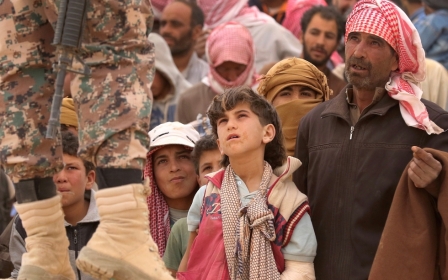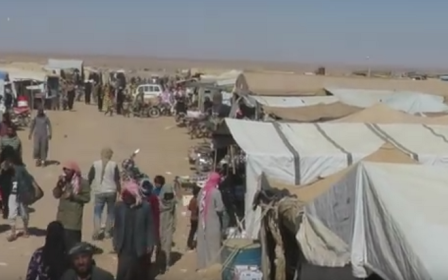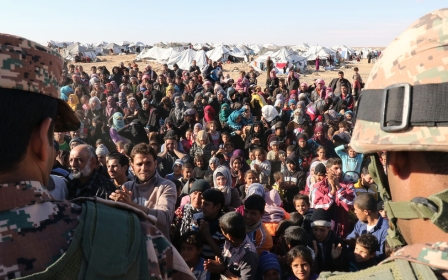UN delivers aid to Syrians on Jordan border for first time since June
UN aid agencies have successfully managed to convey aid to tens of thousands of Syrian refugees trapped along the Jordanian border for the first time since June.
Cranes hoisted huge white bags with rice, lentils and dates from Jordan into tent camps on the Syrian side of a border berm - an unprecedented way of delivering UN aid to tens of thousands of displaced Syrians cut off from outside help for almost two months, the Associated Press news agency reported.
The three-day delivery to two makeshift encampments in a remote desert area ended on Thursday, the AP said, citing UN aid agencies.
Desperately needed food and hygiene supplies finally arrived, providing a key lifeline to those living in makeshift refugee camps and unable to enter Jordan, according a joint statement by the heads of the World Food Programme, the children's agency UNICEF and the International Organisation for Migration, as well as the United Nations High Commissioner for Refugees.
Jordan closed its border with Syria in June after a suicide bombing claimed by the Islamic State group killed seven soldiers.
The attack took place near a makeshift desert camp and aid groups have since been unable to deliver supplies to Syrian refugees stranded at the border.
The heads of the four UN agencies announced the "successful completion of a relief operation to provide more than 75,000 people with food and humanitarian items". Other estimates have put the number of those displaced even higher, suggesting 100,000 people may be marooned on the border.
"Unable either to cross the border or turn back, the situation facing these women, men and children has grown more dire by the day," the statement said.
"Sheltering in makeshift tents in harsh desert conditions with temperatures of up to 50 degrees Celsius (122 degrees Fahrenheit) and sudden sand storms, they are without sufficient food and have barely enough water to survive," the statement added.
However, the future of further aid deliveries is uncertain. The Jordanian government agreed on 13 July to a one-off delivery for those trapped on its border after an appeal by the United Nations, but it took more than three weeks for the drop to take place and Amman has not said if it will allow additional supplies to be distributed.
The UN aid agency heads warned that health care was "urgently" needed, particularly for pregnant women, children and other vulnerable groups such as the elderly and the sick.
"We look forward to further efforts to reach people… with humanitarian assistance in time to save their lives," they said, thanking the Jordanian government for its cooperation.
Jordan declared the border area a "military zone" after the June attack, blocking access to Syrian refugees and sparking fears over their fate.
Several international aid and rights groups have since urged Jordan to revoke its decision and keep its borders open to refugees fleeing Syria's five-year war.
Jordan already hosts hundreds of thousands of Syrian refugees.
New MEE newsletter: Jerusalem Dispatch
Sign up to get the latest insights and analysis on Israel-Palestine, alongside Turkey Unpacked and other MEE newsletters
Middle East Eye delivers independent and unrivalled coverage and analysis of the Middle East, North Africa and beyond. To learn more about republishing this content and the associated fees, please fill out this form. More about MEE can be found here.




